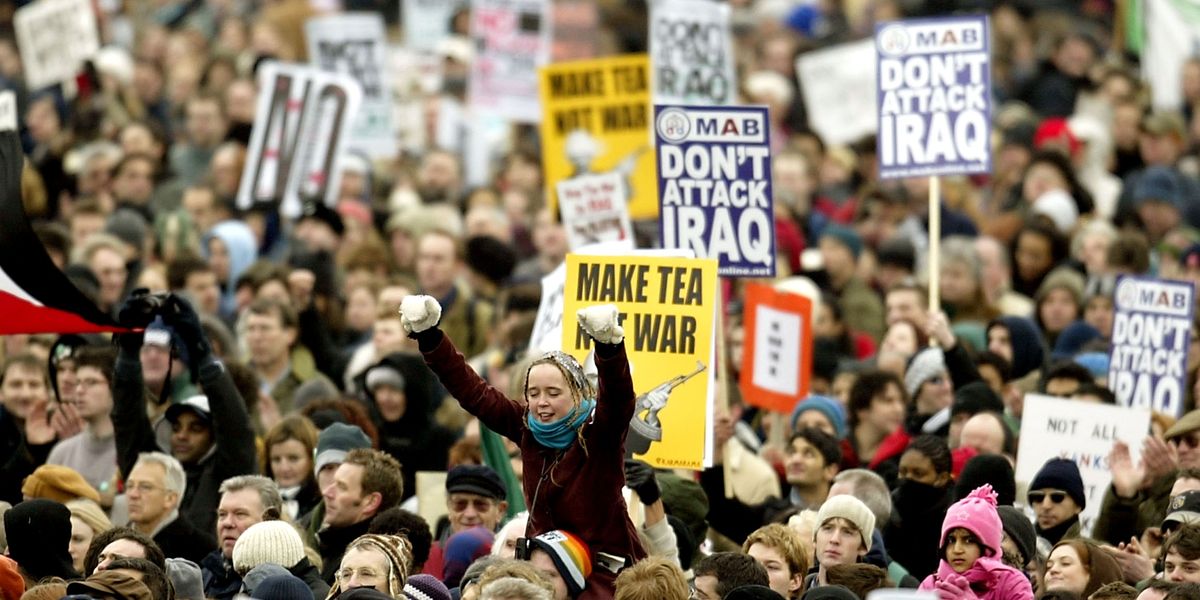
"All wars are fought twice, the first time on the battlefield, the second time in memory." -- Viet Thanh Nguyen
As mainstream U.S. media outlets pause to remember the U.S. invasion of Iraq, it's clear that there's a lot they hope we'll forget—first and foremost, the media's own active complicity in whipping up public support for the war.
But the more you dig into mainstream news coverage from that period, as our documentary team did last week when we put together this five-minute montage from our 2007 film War Made Easy, the harder it is to forget how flagrantly news networks across the broadcast and cable landscape uncritically spread the Bush administration's propaganda and actively excluded dissenting voices.
After 20 Years, Will US News Media Finally Admit its Craven Complicity in Iraq War? | WAR MADE EASY www.youtube.com
The numbers don't lie. A 2003 report by the media watchdog Fairness & Accuracy In Reporting (FAIR) found that in the two weeks leading up to the invasion, ABC World News, NBC Nightly News, CBS Evening News, and the PBS Newshour featured a total of 267 American experts, analysts, and commentators on camera to supposedly help make sense of the march to war. Of these 267 guests, an astounding 75% were current or former government or military officials, and a grand total of one expressed any skepticism.
Meanwhile, in the fast-growing world of cable news, Fox News's tough-talking, pro-war jingoism was setting the standard for ratings-wary executives at most of the more "liberal" cable networks. MSNBC and CNN, feeling the heat of what industry insiders were calling "the Fox effect," were desperately trying to outflank their right-wing rival—and one another—by actively eliminating critical voices and seeing who could bang the war drums loudest.
At MSNBC, as the Iraq invasion approached in early 2003, network executives decided to fire Phil Donahue even though his show had the highest ratings on the channel. A leaked internal memo explained that top management saw Donahue as "a tired, left-wing liberal" who would be a "difficult public face for NBC in a time of war." Noting that Donahue "seems to delight in presenting guests who are anti-war, anti-Bush and skeptical of the administration's motives," the memo warned ominously that his show could end up being "a home for the liberal antiwar agenda at the same time that our competitors are waving the flag at every opportunity."
Two decades later, as we hurtle ever closer to potentially catastrophic new wars, there's been virtually no accountability or sustained reporting in mainstream news media to remind us of their own decisive role in selling the Iraq war.
Not to be outdone, CNN news chief Eason Jordan would boast on air that he had met with Pentagon officials during the run-up to the invasion to get their approval for the on-camera war "experts" the network would rely on. "I think it's important to have experts explain the war and to describe the military hardware, describe the tactics, talk about the strategy behind the conflict," Jordan explained. "I went to the Pentagon myself several times before the war started and met with important people there and said . . . here are the generals we're thinking of retaining to advise us on the air and off about the war, and we got a big thumbs up on all of them. That was important."
As Norman Solomon observes in our film War Made Easy, which we based on his book of the same name, the bedrock democratic principle of an independent, adversarial press was simply tossed out the window. "Often journalists blame the government for the failure of the journalists themselves to do independent reporting," Solomon says. "But nobody forced the major networks like CNN to do so much commentary from retired generals and admirals and all the rest of it . . . It wasn't even something to hide, ultimately. It was something to say to the American people, 'See, we're team players. We may be the news media, but we're on the same side and the same page as the Pentagon.' . . . And that really runs directly counter to the idea of an independent press."
It's an act of forgetting we can ill afford, especially as many of the same media patterns from 20 years ago now repeat themselves on overdrive...
The result was a barely debated, deceit-driven, headlong rush into a war of choice that would go on to destabilize the region, accelerate global terrorism, bleed trillions of dollars from the U.S. treasury, and kill thousands of U.S. servicemembers and hundreds of thousands of Iraqis, most of them innocent civilians. Yet two decades later, as we hurtle ever closer to potentially catastrophic new wars, there's been virtually no accountability or sustained reporting in mainstream news media to remind us of their own decisive role in selling the Iraq war.
It's an act of forgetting we can ill afford, especially as many of the same media patterns from 20 years ago now repeat themselves on overdrive–from the full-scale reboot and rehabilitation of leading Iraq war architects and cheerleaders to the news media's continuing over-reliance on "experts" drawn from the revolving-door world of the Pentagon and the arms industry (often without disclosure).
"Memory is a strategic resource in any country, especially the memory of wars," the Pulitzer Prize-winning novelist Viet Thanh Nguyen has written. "By controlling the narrative of the wars we fought, we justify the wars we are going to fight in the present."

 1 year ago
67
1 year ago
67

